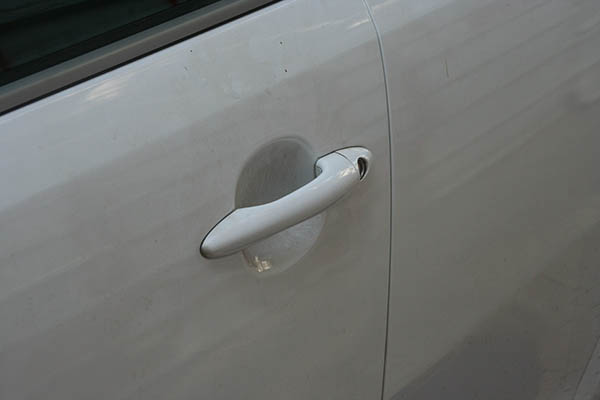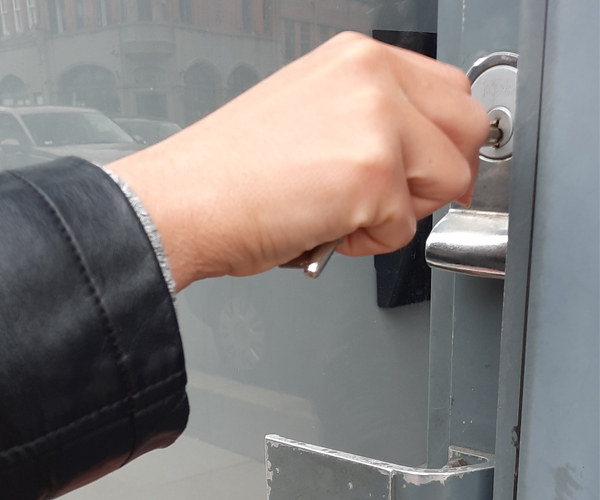
Has the question “Can locksmiths open any door?” ever crossed your mind? If that’s the case, this blog post tries to explain and shed light on locksmiths’ skills and abilities.
The duties of a locksmith extend beyond making copies of lost keys and replacing them. They are expert craftsmen who are equipped with a wide range of tools and methods to handle a variety of locks. A professional locksmith’s tools enable them to operate a wide variety of locking mechanisms, from conventional pin and tumbler locks to advanced electronic locks.
Locksmiths go through a rigorous training program where they study the construction and functionality of various kinds of locks. Their capacity to open any door, whether it is for a residential property, a commercial establishment, or a vehicle, is based on this understanding.
But various locks call for various strategies. For instance, a set of tools especially made for the purpose could be used to pick a domestic pin and tumbler lock. On the other side, commercial locks, which frequently offer a higher level of security, may require more sophisticated techniques, including lock drilling.
Not only are locksmiths skilled in opening doors, but they also have a thorough understanding of how to do it without causing more harm. They have extensive training, practical experience, and innate problem-solving skills, which contribute to their level of finesse.
In conclusion, locksmiths can unlock almost any door thanks to their wide range of skills and understanding of various lock mechanisms. A seasoned locksmith will offer a solution without endangering your possessions, whether you’re locked out of your house, business, or car. To ensure a successful and hassle-free service, always make sure you’re entrusting your locks to a licensed and professional locksmith.
How Locksmiths Tackle Residential, Commercial, and Vehicle Door Unlocking
Locksmiths prove to be the unsung heroes when it comes to securing our spaces as they navigate a world filled with locks and keys. But how precisely do they deal with the many locks on entrances to homes, businesses, and cars?
Traditional deadbolts and knob locks are frequently used in residential settings, according to locksmiths. When keys are lost or locks break, a professional locksmith can unlock these doors using a variety of instruments like tension wrenches and pick sets. Gaining entry once more is desired without causing harm to the lock or door.
On the other hand, commercial doors frequently have high-security locks, such as keycard systems or biometric locks. These locks add an additional degree of security, but they also require a different set of locksmithing abilities. Locksmiths with advanced training may operate these sophisticated locks utilizing sophisticated instruments and techniques, such as lock decoding or bypassing electronic components.
Vehicle doors pose a special problem. Modern cars, especially, often have car locks with high-tech security systems. Locksmiths must adjust to a continuously changing environment, from conventional wafer locks to transponder key systems. To access car doors, methods like lock picking, impressioning, or decoding are frequently utilized. This prevents drivers from becoming stuck because of broken locks or lost keys.
In conclusion, locksmiths are equipped with the knowledge and resources necessary to handle any door, whether it be on a home, business, or automobile. They are able to operate different lock types with efficiency and effectiveness because of their extensive experience and technological know-how. But keep in mind that not every locksmith is created equal. To get the best results for your lock-related issues, always make sure you’re getting assistance from a licensed and professional locksmith.
Balancing Limitations and Legalities in the Locksmithing Profession when unlocking doors

Even though locksmiths are skilled at unlocking doors, it’s important to realize there are some restrictions on what they may and should accomplish. While helping people who have lost access to their property is a locksmith’s primary objective, they also work within certain ethical and legal constraints.
Locksmiths are prohibited from engaging in illegal actions by both the law and their professional ethics. For instance, even if a client requests it, they cannot aid in breaking and entering. Before they are able to lawfully unlock a door, locksmiths demand identification of the property or proof of authorized access. An ID that matches the home address, a lease, or permission from the owner of a business are all acceptable forms of verification.
A locksmith should not undertake all tasks due to safety issues or the need for specialized skills. For instance, unless they have specialized training and clearance, locksmiths normally avoid handling locks connected to high-security sites, such as jails or military facilities.
Locksmiths must abide by a strict code of ethics or policies in addition to the law. This code encourages professionalism, sincerity, and high-quality work. A locksmith should never produce duplicate keys without the owner’s permission, maintain the security of their customers’ properties, or violate their clients’ privacy.
The ethical and legal restrictions that locksmiths must abide by help to uphold the profession’s integrity and safeguard both the locksmith and the client. This compromise guarantees that locksmiths may help those who legitimately need it while discouraging potential abuse of their abilities.
In conclusion, being a locksmith requires more than just technical proficiency and talent; it also requires the ability to strike a delicate balance between doing good deeds and abiding by the law and ethical standards. So, the next time you need a locksmith, you can feel secure knowing that you’re dealing with someone who is dedicated to upholding this important balance.
How to Choose a Reputable Locksmith to Open your Door Locks
It takes a certain kind of locksmith to open door locks. Making a wise choice of a dependable locksmith who is certified and insured is essential to ensuring your safety.
A locksmith’s certification, which demonstrates that they have received approval from a professional organization, ensures their technical proficiency. It shows that they are up to speed with the most recent abilities, methods, and moral principles. Additionally, if the locksmith is insured, you are protected in the event that they cause harm while providing service.
So how can you check a locksmith’s credibility?
First, look for certification verification. Reputable locksmiths frequently hold certifications from professional associations, which attest to their considerable training.
Second, request a business card and ID. Reputable locksmiths shouldn’t have any trouble showing their identification, and their vehicles typically carry the name of their business on them.
Read ratings and reviews, third. Online reviews, while not completely reliable, can give important information about a locksmith’s standing and level of service.
Finally, search for precise cost estimates. Prior to starting work, a qualified locksmith will offer a detailed estimate that includes an explanation of all service fees.
In conclusion, a locksmith’s responsibility extends beyond merely opening doors to assuring the client’s peace of mind. While locksmiths have a unique set of skills that enable them to work with various locks and security systems, they are also subject to ethical and legal guidelines that protect both the client and the industry as a whole.
Therefore, if you ever find yourself locked out, keep in mind that when you hire a professional to open a door, you’re also entrusting them with your safety and security. Make a sensible choice when hiring a locksmith because their knowledge and professionalism are essential to ensuring that your secured doors are unlocked in a secure manner.
- Opening car doors
- State-of-the-art automobile locks installed affordably
- Re-keying your auto locks
- Emergency auto lockouts delivered
- Transponder key programming
- Make Car Keys
- Making of Transponder keys
- Retrieve Car Keys
- Ignition Cylinder replacement
- And many more
About Us
© 2023 Privacy Policy | Terms of Service
- Residential Services
- Commercial Services
- Auto Services
- Emergency Services

